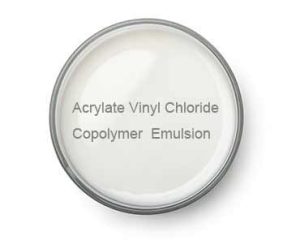Acrylate-Vinyl Chloride Copolymer Emulsion
An environmentally acceptable architectural paint for exterior and interior additions for precast cement blocks is called a vinyl chloride copolymer emulsion.

Specifications:
Excellent stability and prolonged storage outstanding adherence
Exemplary water resistance, exemplary alkali resistance, and exemplary adhesive qualities
Can substitute for acrylic emulsion
Product specifications:
| Items | VCAR-20 | VCAR-30 | VCAR-40 | VCAR-60 | VCAR-70 | VCAR-80 |
| Solid content(%) | 48±2 | 47±2 | 48±2 | 48±2 | 48±2 | 48±2 |
| Viscosity(s) | 10-18 | 11-20 | 10-18 | 10-18 | 11-20 | 11-20 |
| Glass Transition Temp(℃) | 30 | -15 | 4 | 58 | 68 | 80 |
| Minimum Film Forming Temp (℃) | 20-28 | <0 | 6-8 | 60-62 | 64-66 | 81-83 |
| PH | 2-5 | 4-5 | 2-4 | 7-8 | 7-8 | 7-8 |
| Particle size(μm) | 0.2-0.3 | 0.2-0.3 | 0.2-0.3 | 0.2-0.3 | 0.2-0.3 | 0.2-0.3 |
| Calcium ion stability (0.5%CaCl2 solution) | Yes | Yes | Yes | Yes | Yes | Yes |
| Mechanical stability(2000rpm) | Yes | Yes | Yes | Yes | Yes | Yes |
| Storage stability (50℃,30D) | Yes | Yes | Yes | Yes | Yes | Yes |
Applications:
VCAR-20 is Mainly used in anti-corrosive primer in heavy metal, it can replace alkyd lacquer.
VCAR-30 It is identical to Lubrizol’s PVC series emulsion and is mostly utilized in the back coating, flocking adhesive, carpet back coating, and back coating of industrial textiles.
VCAR-40 Vinyl Chloride Copolymer Emulsion can be used in place of brominated flame retardants.
VCAR-60 is Primarily used as a plastic substrate primer for PVC, ABS, and PC.
VCAR-70 Mainly used in the printing ink, paper processing & surface treatment of leather
VCAR-80 Plastic paint, wood sealing primer, and PVC ink are the most common applications.
